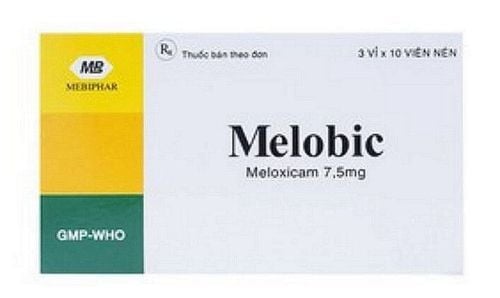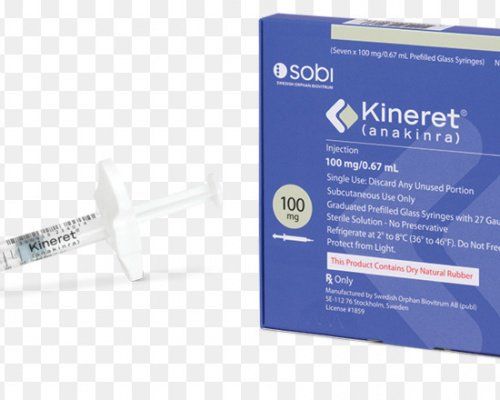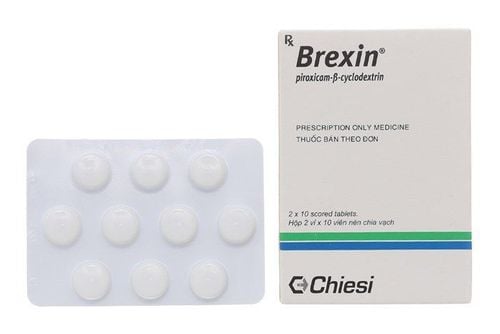This is an automatically translated article.
Ikonap has the main active ingredient Nabumetone, belongs to the group of non-steroidal anti-inflammatory drugs, prepared in the form of film-coated tablets. The drug is indicated for the purpose of anti-inflammatory pain relief in the following cases: Rheumatoid arthritis and pain due to osteoarthritis...
1. What is Ikonap?
Ikonap has the main active ingredient Nabumetone, belongs to the group of non-steroidal anti-inflammatory drugs, prepared in the form of film-coated tablets. Ikonap is used to relieve pain, reduce swelling and stiffness in arthritis, polyarthritis, and osteoarthritis pain. However, Ikonap should only be used in acute arthritis, limiting its long-term use. Therefore, if you have chronic arthritis, you need to talk to your doctor about non-drug treatments or use other pain relievers to suit the patient.
2. Indications of the drug Ikonap
Ikonap is indicated in the following cases:
Reduce pain symptoms caused by osteoarthritis. Rheumatoid arthritis with the aim of symptomatic treatment. 3. Contraindications of the drug Ikonap Ikonap is contraindicated for use in the following cases:
Patients with a history of allergy, hypersensitivity to Nabumetone or any of the excipients of the drug Ikonap. Patients with recurrent peptic ulcer , bleeding or perforation of the gastrointestinal tract . Patients with a history of hypersensitivity reactions such as: Asthma, rhinitis, angioedema, urticaria when using Ibuprofen, Aspirin or other non-steroidal anti-inflammatory drugs. Patients with heart failure, liver failure and severe kidney failure. Patients with a history of bleeding, perforation of the stomach - duodenum, intestine related to previous treatment with non-steroidal anti-inflammatory drugs. Patients with cerebrovascular accident have cerebral hemorrhage. Patients with hereditary problems of galactose intolerance, Lapp lactase deficiency or glucose/galactose malabsorption.
4. Dosage and how to use Ikonap
4.1. How to use Ikonap drug Ikonap drug is produced in the form of film-coated tablets with the content of each 500mg Nabumetone tablet, used orally. Before taking Ikonap, patients need to carefully read the instructions for use on the drug leaflet. When taking orally, swallow the tablet whole with water, Ikonap should be taken during or after a meal to avoid stomach irritation.
4.2. Dosage of Ikonap Adult:
Take 2 tablets/time x 1 time/day at bedtime. In case of severe or prolonged symptoms, or during an exacerbation of inflammation: take 2 more tablets in the morning after meals. Elderly:
It is recommended that the daily dose of Ikonap not exceed 2 tablets (1g)/day. Dosage: 1 tablet (500mg)/day after meals. Children: There is no pediatric dose.
5. Undesirable effects of Ikonap
Patients may experience some undesirable side effects as follows after using Ikonap, including:
Common side effects:
Body and skin: Rash, rash and peripheral edema. Digestive system: Abdominal distention, flatulence, dyspepsia, abdominal pain, nausea and diarrhea. Respiratory system: Pharyngitis, upper respiratory tract infections, rhinitis, sinusitis and flu-like symptoms. Nervous system: Feeling dizzy, headache, insomnia and fatigue. Uncommon side effects:
Nervous system: Depression, anxiety and confusion. Eyes: Eye disorders and decreased visual acuity. Digestive system: stomatitis, dry mouth, vomiting, stomach and duodenal ulcers, bleeding and black stools. On the liver: Increased liver enzymes. Skin and body: Skin sensitization, sweating and general weakness. Respiratory system: Nosebleeds, dyspnoea and respiratory disorders Rare side effects:
Systemic and skin: Erythema multiforme, Stevens-Johnson syndrome and anaphylactoid reactions. Digestive system: Gastrointestinal bleeding, intestinal perforation, hemorrhagic colitis, esophageal perforation, pancreatitis and intestinal obstruction. Blood: Anemia, pancytopenia, leukopenia, agranulocytosis and decreased platelet count. Renal-urinary system: Interstitial nephritis and acute renal failure. If you experience the above symptoms, you need to stop using Ikonap and notify your doctor or pharmacist for appropriate treatment.
6. Be careful when using Ikonap
When using Ikonap, patients should note the following information:
Use Ikonap with caution in patients with existing diseases, or a history of bronchial asthma because it can cause acute asthma attacks. Ikonap should not be used concomitantly with other nonsteroidal anti-inflammatory drugs, including selective cyclooxygenase-2 inhibitors. Ikonap should be used with caution in patients with a history of, or ongoing, peptic ulcer or gastrointestinal bleeding because it can cause severe bleeding and gastrointestinal tract, which can lead to death. Taking non-steroidal anti-inflammatory drugs, including Ikonap, can reduce prostaglandin formation and cause rapid renal failure. The patients most at risk for this reaction are patients with severe cardiovascular disease, liver failure, renal failure (creatinine clearance less than 30 ml/min), diuretic users, and the elderly with reduced levels glomerular filtration. Renal function should be checked periodically when taking Ikonap. Patients with a history of hypertension and/or mild to moderate congestive heart failure should be monitored regularly because the risk of fluid retention edema has been reported in association with treatment with nonsteroidal anti-inflammatory drugs, including Ikonap. Ikonap should be used with caution in patients with uncontrolled hypertension, congestive heart failure, ischemic heart disease, peripheral artery disease, cerebrovascular disease. The risk of gastrointestinal bleeding, perforation or ulceration is higher with increasing Ikonap dose. In patients with a history of ulcers, particularly those with gastrointestinal bleeding or perforation, or the elderly, Ikonap therapy should be initiated at the lowest possible dose. Ikonap therapy in combination with gastrointestinal protectants must be considered for these patients. Patients with a history of gastrointestinal disease, especially in the elderly, should report any unusual symptoms (especially gastrointestinal bleeding, black stools, vomiting blood,...) especially in the early stages of treatment. Stop taking Ikonap immediately if any of the above symptoms occur. In patients with systemic lupus erythematosus (SLE) and mixed connective tissue disorders, the use of Ikonap may increase the risk of aseptic meningitis, so it should be used with caution. Serious skin reactions such as: Stevens-Johnson syndrome (SJS), toxic epidermal necrolysis (TEN), exfoliative dermatitis may occur with the use of Ikonap. If a patient has developed a serious reaction such as SJS, TEN or DRESS prior to taking non-steroidal anti-inflammatory drugs, Ikonap treatment should not be initiated in this patient. The use of Ikonap may decrease fertility in women and is not recommended in women who are trying to become pregnant. Ikonap can mask the signs of infectious disease, patients taking the drug should pay attention to the symptoms they experience so that they can be treated promptly. Cases of blurred vision or decreased visual activity have been reported with the use of NSAIDs, including Ikonap. Have the patient see an ophthalmologist if he or she has these symptoms. Note to pregnant women: Ikonap is contraindicated in pregnant women, especially in the last 3 months of pregnancy. Note to lactating women: Breastfeeding should be stopped while using Ikonap. Note when driving and operating machinery: Undesirable effects such as dizziness, drowsiness, confusion, fatigue and visual disturbances may occur after taking Ikonap, which is dangerous for drivers, operating machinery or workers requiring alertness.
7. Ikonap drug interactions
Patients using Ikonap should pay attention to the following drug interactions:
Diuretics, angiotensin-converting enzyme inhibitors (ACEIs), angiotensin receptor antagonists (ARA) may reduce the effect when used concurrently with Ikonap. Potassium-sparing diuretics when used with Ikonap may increase the risk of hyperkalemia. Cardiac Glycosides: Ikonap may worsen heart failure, decrease glomerular filtration rate and increase plasma glycoside levels. Lithium: Ikonap reduces lithium excretion. Methotrexate: Ikonap reduces the elimination of methotrexate. Ciclosporin: Ikonap increases the risk of nephrotoxicity when ciclosporin is co-administered. Mifepristone: Ikonap should not be used for 8-12 days after taking mifepristone because Ikonap may decrease the effect of mifepristone. Corticosteroids: Increased risk of gastrointestinal ulceration or bleeding when Ikonap is co-administered. Anticoagulants: Ikonap may enhance the effects of anticoagulants, such as warfarin. Probenecid: reduces metabolism and reduces the elimination of Ikonap. Quinolone antibiotics: Patients taking Ikonap and Quinolones may have an increased risk of seizures. Alcohol, Bisphosphonates, Oxpentifylline (pentoxifylline), and Sulfinpyrazone, may increase the risk of gastrointestinal bleeding or ulcers when Ikonap is taken together. Antiplatelet agents and selective serotonin reuptake inhibitors (SSRIs): Increased risk of gastrointestinal bleeding when Ikonap is co-administered. Tacrolimus: There may be an increased risk of kidney toxicity when Ikonap is taken with Tacrolimus. Zidovudine: Increased risk of hematologic toxicity when Ikonap is used with zidovudine. Caution should be exercised when Ikonap is co-administered with other protein-binding drugs, e.g. Sulphonamides, Sulphonylureas or Hydantoin and carefully monitored for signs of overdose. Above is all information about Ikonap drug, patients need to carefully read the instructions for use, consult a doctor / pharmacist before using. Absolutely do not arbitrarily buy Ikonap treatment at home because there may be unwanted side effects.













